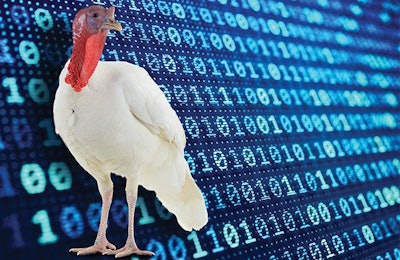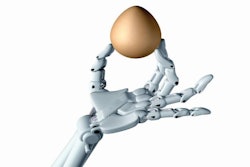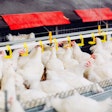
Turkey meat is the fourth favorite meat of Americans, and globally, Americans consume 60% of the 6 million tons of all turkey meat produced. Turkey producers have made big leaps in performance and efficiency, but flocks are still managed with remarkably limited information. Daily feed intake, water intake, real time weights, health and environment data are all based on average flock data and not on individual basis. What could precision turkey production look like, and how will producers harness new digital technologies to improve efficiencies and respond proactively engaged consumers (prosumers)?
The eight digital technologies framework is a great way to consider these questions:
- Sensors: Of the eight technologies, lower implementation costs and immediate quantifiable benefits make this most likely to achieve immediate adoption. Sensors can help achieve individual data collection and precision poultry production. In-house sensors already exist for ammonia, temperature, carbon dioxide, humidity and other environmental indicators.
- Robots: Repetitive tasks that robots can do include checking turkeys or breeders, managing litter, vaccination, sanitizing and perhaps removal of mortalities on farm. Robots used in processing plants are already cutting meat from the bones, using cameras to maximize yield and identify imperfections and rejects.
- Artificial intelligence: As the backbone of many other technologies, opportunities abound to use artificial intelligence with camera vision (machine learning) and auditory analysis (cheeping, stress signals) to improve bird welfare and estimate real time individual bird performance.
- Virtual reality: Training is the most obvious application for virtual reality in the poultry industry, particularly in processing but also in education of field technicians. Already being used to teach equine veterinarians, it could be the future for posting sessions. McDonalds is engaging U.K. consumers to visit the farms their food comes from.
- Augmented reality: Few examples of commercial applications in poultry exist, but the possible uses of augmented reality are wide-ranging, and the technology could still have real-world applications for turkey producers to enhance flock management, such as employing vision goggles to evaluate information from spectoral ranges not visible to the human eye.
- Blockchain: Why are Walmart, Nestlé and other food giants testing this technology? Blockchain can resolve food safety and transparency issues, giving consumers confidence in their food. Cargill launched the first blockchain turkeys for sale on U.S. supermarket shelves for Thanksgiving in a pilot test for 60,000 whole birds in 2017 and for 200,000 in 2018.
- Drones: Row crop farmers already use drones, but is it possible to use them with free-range turkeys to herd, protect them from predators and monitor them?
- 3-D printing: Could processing plants benefit from the ability to 3-D print machine parts on-site to repair equipment?
These eight technologies are part of the Internet of Things (IoT), which brings all data collection points together into an overall system. Without it, precision poultry farming and the opportunities to mine big data will prove difficult to achieve.
Real-time individual bird data can transform turkey production to levels never previously envisaged. Given the inevitable competition turkey faces from larger heavier broilers and meat-like vegetable proteins, greater efficiencies and transparency are a critical part of the industry’s future.
Attend Poultry Tech Summit 2019
Join an exclusive international gathering of industry-changing innovators, researchers, entrepreneurs, technology experts, investors and leading poultry producers at the second Poultry Tech Summit on Nov. 20-22, 2019. Attendees can expect the same groundbreaking innovation and insightful presentations that made the 2018 event well-attended, with deep dialogue on new prospective solutions and action-packed from industry professionals representing 21 countries. The event will be held at the Georgia Tech Hotel & Conference Center. Registration is now open.
The Poultry Tech Summit is presented by WATT Global Media in collaboration with the Georgia Tech Research Institute, USPOULTRY, and the University of Georgia Department of Poultry Science with support from the World’s Poultry Science Association.


















